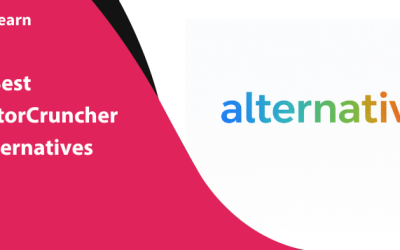SamCart vs. Kajabi: Which is the Best Online Course Platform?
Choosing the right platform for upscaling your business is essential to thrive in the fierce creator economy. A robust platform with hands-on creation, sales, marketing and analytics acts as a conversion-boosting tool! Two noteworthy choices for course creators — are Samcart and Kajabi.
While Samcart has recently diversified into course creation, Kajabi extends its scope beyond course selling. As an entrepreneur or course creator, choosing the right platform could prove to be a make-or-break deal!
In this review of Samcart vs. Kajabi, we provide a comprehensive comparison between the two platform giants. So, let’s find the right fit for your business!
What is SamCart?
Samcart is a complete e-commerce platform that helps you with selling, promoting, cross-selling, managing payments, and more. The platform describes itself as “conversion-driven checkout software“; however it introduced the “course app feature” in June 2021.
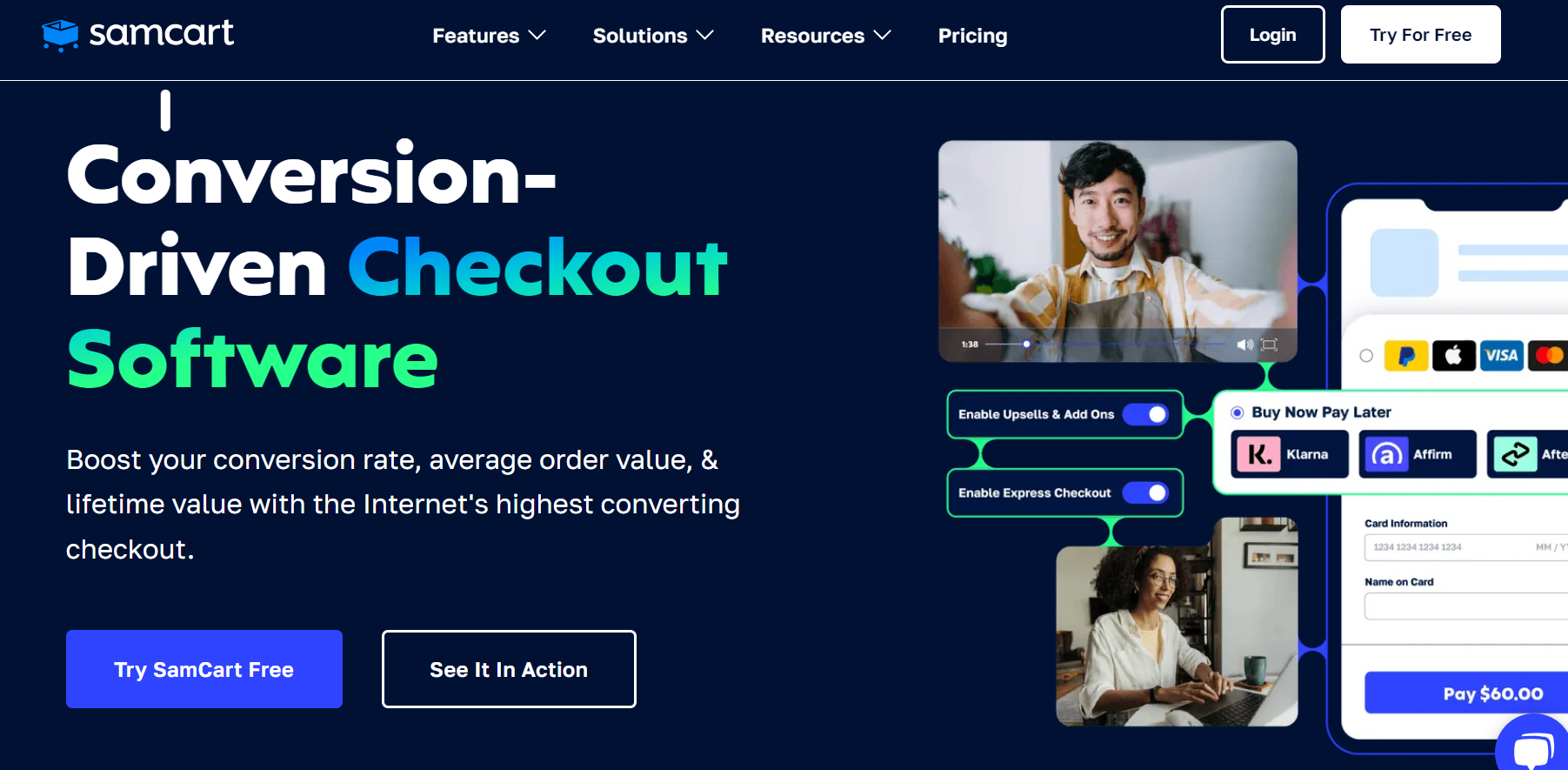
The dynamic feature helps to create, deliver and sell courses within no time!
From an excellent drag-and-drop feature that creates befitting webpages to customized templates, the software caters to diverse industries. With one-click upsells, order bumps, and shopping cart abandonment recovery, Samcart helps to overcome the hiccups in your business!
What is Kajabi?
Kajabi, in every sense, is an “all-in-one business platform” that offers you all the tools and resources for running a successful business. From efficient website & landing page builder to advanced email marketing and automation, Kajabi is a powerhouse for your e-commerce business!
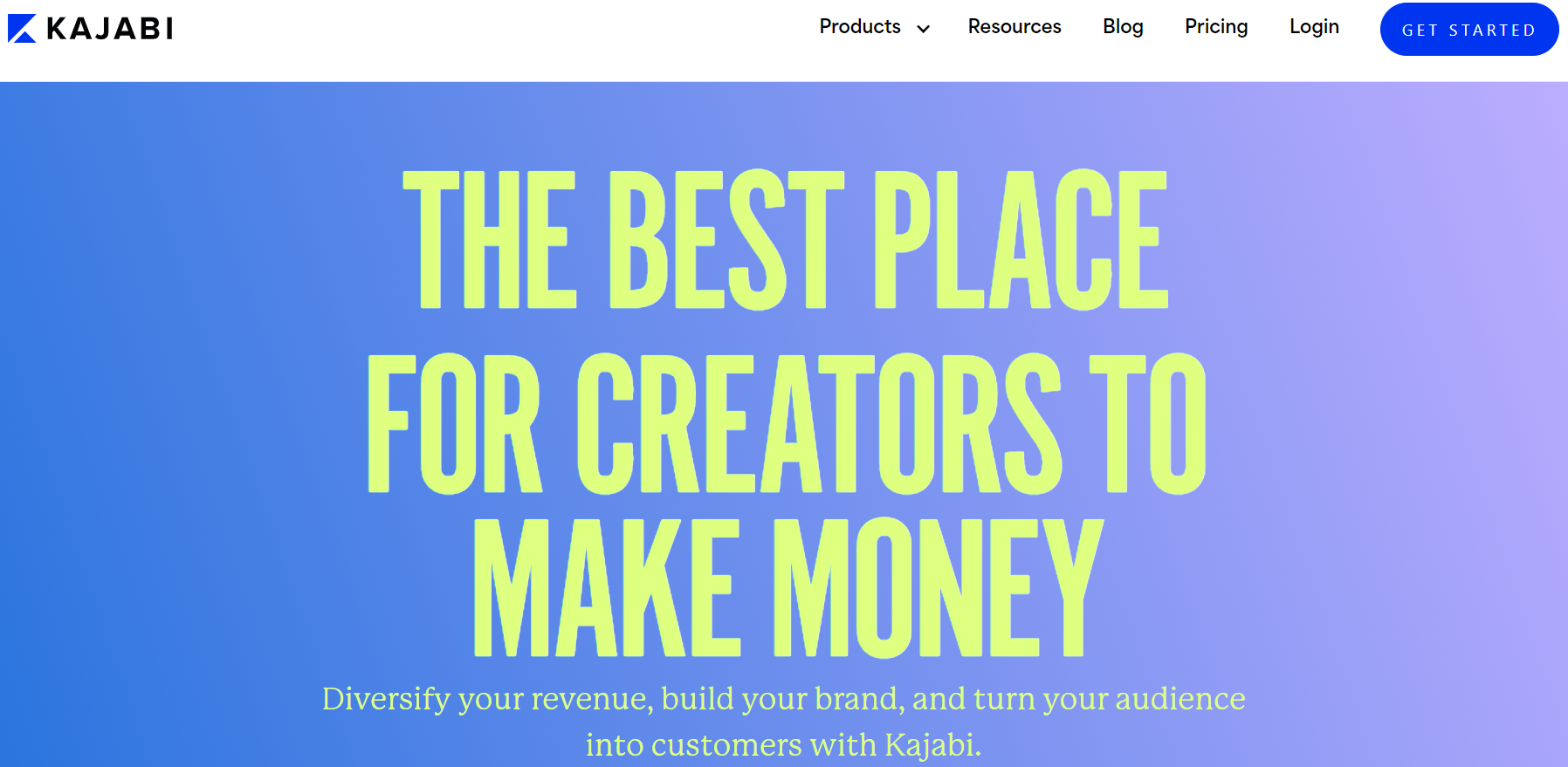
So, what can you build your business on? Courses, memberships, coaching, digital products—Kajabi offers extensive options to grow your business. Kajabi has helped creators earn $6 billion in revenue and serve 75 million customers. The platform’s easy-to-use interface and stellar marketing make it a preferred choice for entrepreneurs and creators.
Samcart Vs. Kajabi
According to Goldman Sachs, the creator economy has mushroomed in recent years and is expected to reach $480 billion by 2027. So, as we stride towards a ramped-up creator economy, creators need to pick the right arsenals to survive! Let’s draw a detailed comparison between two powerful platforms we have come across!
So, here we get started with the detailed Kajabi vs. Samcart comparison:
Course Creation
Kajabi is a popular course creation platform built on core course functionality. Its founders developed the platform because they couldn’t find easy ways to sell courses online.
While both platforms have an easy-to-use interface for course creation, SamCart’s course builder is ideal for beginners.
Now, let’s take a look at what each of the platforms offers! Kajabi helps you to divide the courses into easy-to-navigate modules. Course creators can integrate audio, video, and downloadable course materials into the course.
However, Kajabi doesn’t have a built-in video hosting feature. Instead, it relies on Wistia to host videos.
Also, it offers comprehensive assessments with quizzes, certificates, and guidebooks embedded within the lessons. Want to save your time on course creation? Kajabi’s customized course template could save those hours spent on designing! Another feature that helps you to skip the groundwork is course blueprints. It offers you sample lesson texts and content structure to easily create your course.
On the other hand, course creation has been a relatively new arena for SamCart, but it has nailed it pretty well! Samcart’s course creation feature stands on par with Kajabi and gets most of the elements right. For instance, it allows creating courses with videos, audio files, and downloadables. However, it lags somewhat in its editing and customization capabilities.
Through SamCart, you can sell digital downloads, courses, memberships and coaching services. Additionally, you require third-party software like Vimeo, Wistia, and YouTube to host your videos.
Winner: Comparatively, Kajabi has a better selection of course-creation features that save you time and effort.
Website Builder
Both Samcart and Kajabi offer an intuitive interface for building websites, pop ups, and landing pages. Both platforms offer customized website templates catering to diverse niches like cooking, fitness, coding, etc. However, Kajabi provides a complete website experience with a homepage, navigation menu, blog, and contact forms.
With a drag-and-drop page builder, you can customize the buttons, images, animations, and text boxes. Further, you can add a custom domain to increase your platform visibility.
Overall, Kajabi has a responsive layout that caters to every screen size and defines a complete platform experience!
Conversely, SamCart doesn’t offer a complete website experience like Kajabi. Samcart only offers an individual product sales page rather than a complete website. So, if you have a website, you can directly link it to the sales page! However, the look and feel of the sales page and the actual website could be different and could affect the user experience!
Winner: Here, Kajabi edges ahead with its dynamic website builder that offers a full-fledged website experience.
Third-Party Integrations
While course creation and delivery are essential, integrating your platform with third-party applications helps to scale your business. Samcart integrates with more than 20+ popular third-party applications to scale your business. Mailchimp, WordPress, Hubspot, Zapier, ActiveCampaign, and MaroPost are a few of the notable integrations.
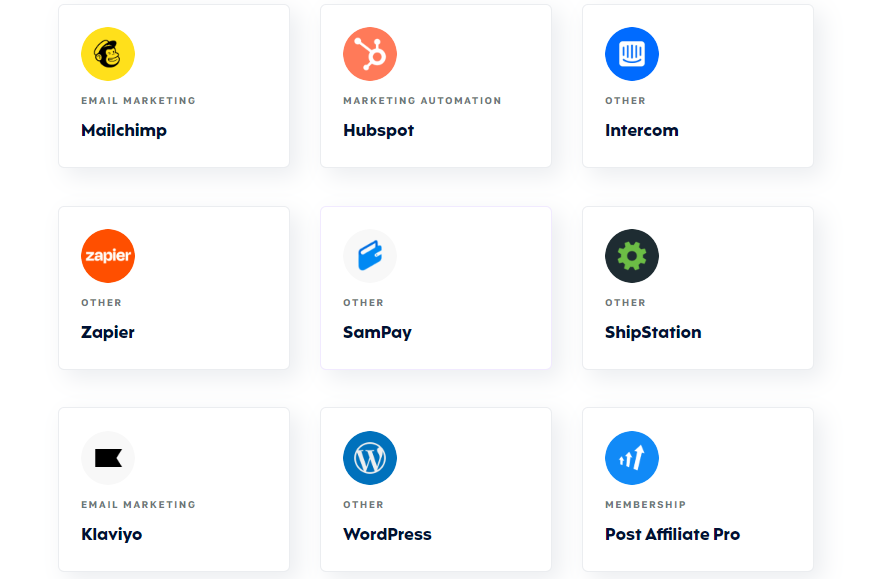
Even though both platforms integrate payment gateways like Stripe and PayPal, they have their own proprietary payment processors.
Now, let’s spin the bottle to Kajabi! It is an all-in-one course platform, allowing popular third-party integrations with Mailchimp, Stripe, Zapier, Google Analytics, etc.
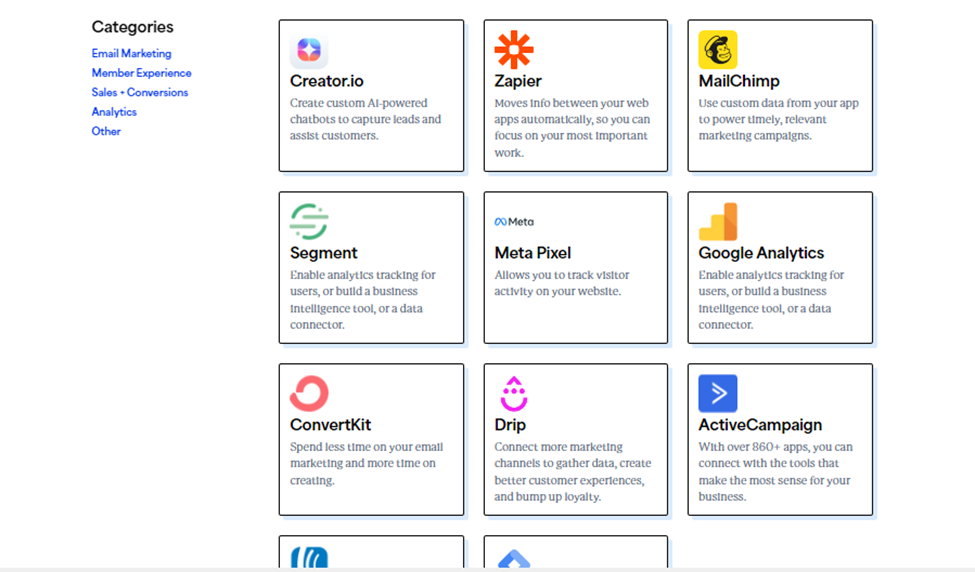
Samcart seems to be an affordable option, but the overall platform cost, along with integrations, could be more than Kajabi.
Winner: If you are looking for specific integrations, SamCart is a great option. However, if you want multiple integrations under the same roof, Kajabi is economical!
Email Marketing
If you thought email marketing had lost its charm, think again! The age-old strategy still holds relevance as the most effective tool for your business. In fact, 87% of brands consider email marketing critical for their business.
Now, let’s see how both platforms fare in this realm! Needless to say, Kajabi scores points here with its built-in email marketing feature. Rather than relying on external platforms for email marketing, Kajabi offers the feature within the platform. So, what’s the gain here? An easy escape from the hassles of integrations!
Kajabi provides customized email templates, subject validation, and an intuitive visual editor to draft compelling emails. Further, it also boasts an extensive sales funnel for a seamless transition from prospecting to purchase.
In contrast, SamCart depends on third-party applications like MailChimp for email marketing. Though you can send transactional emails like refund notifications, subscription reminders, order receipts, etc., Unlike Kajabi, it doesn’t offer an inbuilt email marketing feature. Simply put, you need to shell out a few more dollars for a good email marketing integration.
Winner: Kajabi easily comes up as a superior software with its built-in email marketing support.
Reporting & Analytics
Without an in-depth reporting and analytics feature, your business navigates without a main sail! Kajabi is known for its in-depth reporting on user engagement, course sales, revenue, usability, etc.
Its detailed analytics dashboard provides the following reports:
- Net revenue
- Page reviews
- Products progress
- Subscription metrics,
- Opt-ins
- Offers Sold
- Affiliates
Although SamCart is new to this course creation arena, it does offer essential reports. The following are a few reports to evaluate your business performance:
- Monthly recurring revenue
- Churn rate
- Cash Forecast
- Active Subscriptions
- Order Bump
- Refund
- Average Order Value
Winner: Kajabi wins this segment with detailed reporting, allowing users to make informed business decisions.
E-Commerce
Next, let’s explore the e-commerce features of both platforms. SamCart offers many e-commerce features as a bolt-on checkout software.
Let’s find out how SamCart emerges as a more significant player in this realm:
- Sophisticated upsell and cross-sell feature to increase your total average order value
- Order bumps and add-ons to maximize your profits instead of finding new customers
- Subscription payments, dollar trials and subscription savers for a steady flow of income
- Advanced e-commerce features like coupons, discounts, partial refunds, and more
Kajabi is not far behind in e-commerce; it has several built-in features to sell courses, memberships, and products.
The leading platform offers seamless one-click upsells, integrated payment, and abandonment cart recovery to drive more conversions. The one-click upsells let customers buy more and you earn more—a win-win situation for both!
Additionally, Kajabi offers attractive promotional coupons and deals to convert more leads into customers. These could be dollar-amount or percentage discounts on one-time payments or subscriptions.
Are customer abandonment reducing your overall sales? Kajabi’s cart abandonment recovery sends automated emails reminding customers to purchase the product.
Winner: SamCart leads this segment with its out-of-box e-commerce features.
Sales & Payment Processing
Let’s check their product setup and checkout process to see how both handle the sales and payment process. As you know, both platforms integrate with payment processors like Stripe and PayPal. Besides, both have their default payment processing tools: Kajabi Payments and SamPay.
The good news is that neither of the platforms takes a sales cut from their customer earnings, so you can rake in more money! An essential part of payment processing is the checkout feature. Samcart is primarily conversion-driven checkout software. Its single-page lightning-fast checkout makes product payment a breeze!
Do you need a hack for the hours spent coding? Samcart’s checkout can help you escape the rut! It comes with a host of dynamic features, such as embedded checkout, express checkout, popup checkout, and cart abandonment, to simplify the checkout flow. Samcart also accepts Apple Pay and cryptocurrency.
Kajabi’s payment process is divided into multiple pages and a bit disjointed! A multi-page checkout process tends to have more drop-off points, which could distract the user from the final purchase!
Winner: SamCart is the hands-down winner with its flagship checkout process!
Pricing
On the surface, Samcart appears more budget-friendly than Kajabi; however, each has its own business requirements.
Let’s start with Samcart!
The software has three pricing plans, each with a 7-day free trial. You can either bill monthly or annually.
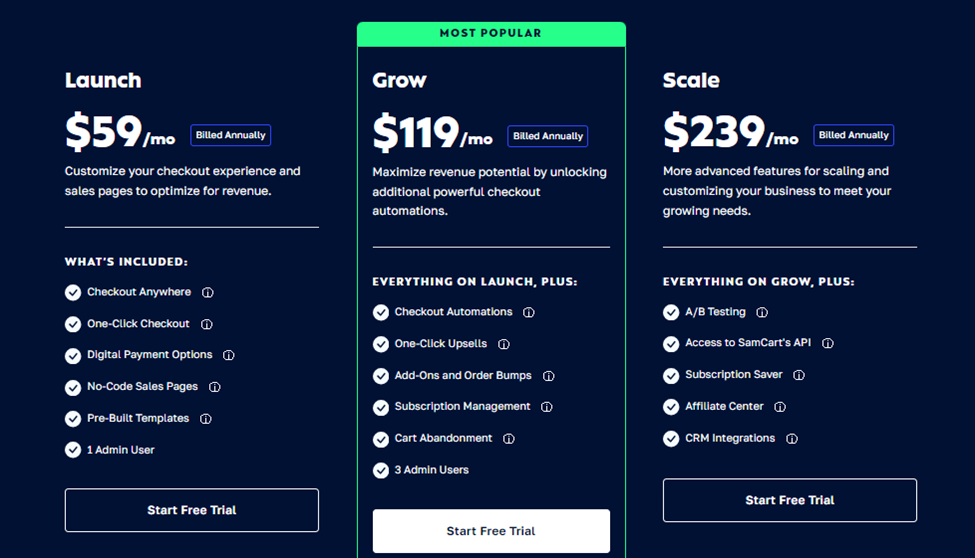
Here’s their rich feature set and prices when billed annually:
- Launch ($79/ month) – checkout anywhere, one-click checkouts, digital payment options, unlimited courses and students, no-code sales page, 1 admin user
- Grow ($159/month) – checkout automation, one-click upsells, add-ons, order bumps, subscription management, card abandonment, 3 admin users.
- Scale ($319/month) – A/B testing, access to Samcart API, subscription server, affiliate center, CRM integrations.
Samcart’s pricing focuses on specific features and caters to businesses that need them.
Kajabi has 4 pricing plans with a 14-day free trial.
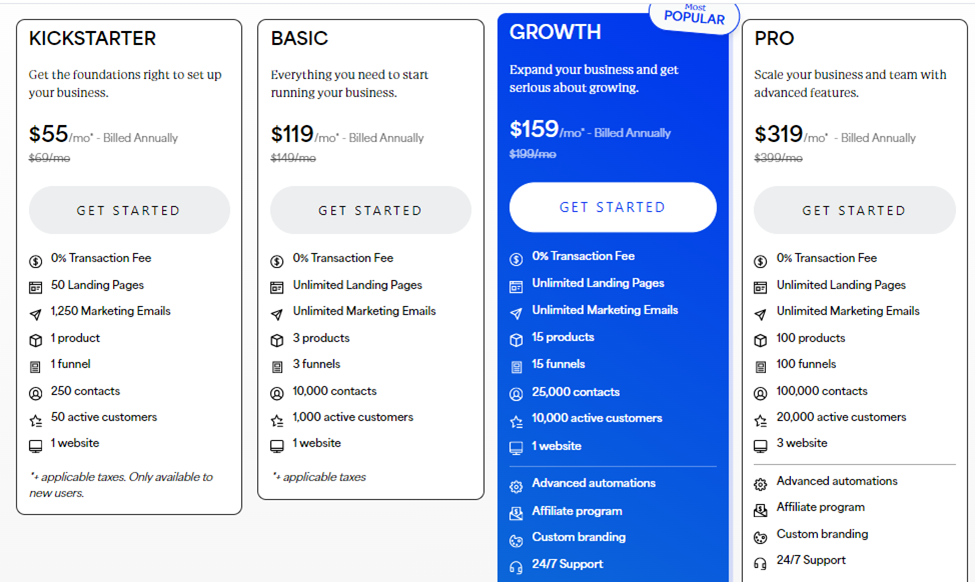
Here’s what Kajabi’s pricing plans look like:
- Kickstarter ($55/ month) – Access to 50 landing pages, 1250 marketing emails, 1 product, 1 funnel, 250 contacts, and 50 active customers.
- Basic ($199/month) – Access to unlimited landing pages and marketing emails, 3 products, 3 funnels, 10,000 contacts, and 1,000 active customers.
- Growth ($159/ month) – This is the most popular plan. It provides access to unlimited landing pages and marketing emails, 15 products, 15 funnels, 25,000 contacts, 10,000 active customers, advanced automation, 24×7 support, and custom branding.
- Pro ($319/ month) – Access to unlimited landing pages and marketing emails, 100 products, 100 funnels, 100,000 contacts, 20,000 active customers, 3 websites, an affiliate program, 24×7 support, and custom branding.
Overall, Kajabi’s pricing plans are designed to fit different business sizes. From setting the foundation and running the business to expanding your business and scaling it, Kajabi serves different business goals.
Winner: If you need an all-inclusive course platform to scale your business, Kajabi fits the bill. However, if you’re seeking a platform that caters to your specific business goals and budget, choose SamCart.
Support
Kajabi offers email and live chat support to assist its users. If you are a Kajabi user with a basic plan, you can submit a request or access the live chat between 6 a.m. and 5 p.m. Pacific time. Growth and Pro plan users can avail of the 24×7 chat service. To get detailed guidance on a specific topic, users can access Kajabi University.
It is a comprehensive training resource that includes detailed courses on how to create and sell courses. For those who need additional help, Kajabi also offers on-demand webinars on scaling your business.
Similarly, SamCart also offers email or live chat support between 9 a.m. and 5 p.m. ET on weekdays. It doesn’t have a great help center like Kajabi, but it offers guidance through a knowledge base, blogs, and webinars.
Winner: Kajabi offers extensive custom support through emails, chat and a detailed help center.
Overview of SamCart vs. Kajabi: Which is the Best Platform?
| Key Points | SamCart | Kajabi |
| Course Creation & Delivery | Limited course creation features as compared to Kajabi. | Specially curated for course creation. |
| Website Builder | Provides only individual product sales pages focusing on checkout, order bumps, cross sells and upsells,etc. | Offers a full-fledged website experience — homepage, navigation menu, blogs, landing pages, contact forms,etc. |
| Third-Party Integrations | Integrates with all popular third-party apps. | All-in-one course platform, offering everything under the same roof. Integrates with all popular third-party apps and has flexible API keys. |
| Email Marketing | Sends only transactional emails and relies on third-party apps for actual email marketing. | In-built email marketing feature with customized templates, subject validation, visual editor. |
| Reporting & Analytics | Provides in-depth reports on net revenue, opt-ins, page views, subscription metrics,product progress and more. | Generates custom reports on monthly recurring revenue, churn rate, cash forecast, active subscriptions, order bump, refund, and more. |
| eCommerce | Extensive e-commerce features like crossells, upsells, order bumps, abandonment cart recovery | Kajabi offers coupons, one-click upsells, abandonment cart recovery, integrated payment. |
| Sales & Payment Processing | Lightning fast checkout process, integrates with popular payment gateways like Stripe and Paypal. | Multi-page payment process leading to a disjoint user experience; integrates with Stripe and Paypal. |
| Pricing | Available at an affordable price range. | Priced slightly higher. |
| Support | Email and chat support; lacks an extensive help center like Kajabi. | Email, chat support,detailed courses on Kajabi University. |
After this detailed comparison, it is clear that both platforms do their job pretty well! While Kajabi scores points in most aspects, it is priced at the higher end. So, if you want to access all the features to skyrocket your business in one place, Kajabi should be your preferred choice!
While it’s clear that you can scale your software with multiple integrations, managing them could be quite challenging. Besides, the overall software and integration cost could be substantial! Both platforms have intuitive drag-and-drop builders for building website pages and landing pages and also offer stunning templates.
Overall, SamCart is relevant for businesses that wish to minimize drop-off points and maximize conversions.
To sum up, SamCart and Kajabi are two powerful platforms for building and marketing courses. But, if you have considerable niche expertise and want to build a thriving community of course creators, it’s crucial to create your own brand! And what’s better than a ready-made clone script like Pinlearn that offers all the features to build the likes of Kajabi and SamCart and offers much more!
Most importantly, you can kick off your entrepreneurial journey without starting from scratch and focus on growing your business. On that note, let’s explore why Pinlearn must be your preferred course-selling platform!
Why Choose Pinlearn For Course-Selling Marketplace?
Pinlearn is an all-inclusive solution for course creators, entrepreneurs, and coaches. Like Kajabi and SamCart, Pinlearn allows creating a course-selling marketplace.
Moreover, it gives 100% ownership over the platform. This helps to create and sell self-paced courses and host live sessions with required customizations.
With its course management software, it’s possible to set up free and paid courses in minutes! A white-label script like Pinlearn helps create a custom brand that elevates your business!
Here’s Pinlearn’s attractive feature set that makes it a viable course-selling solution:
- Create and sell free and paid courses and monetize from them
- Supports multimedia course formats involving audio, video, images and more.
- Advanced reporting & analytics offering insights into earnings, revenue, total courses, course transactions
- Easy deployment
- Impressive add-ons for customizing software as per your business requirement
- Third-party integrations with Mailchimp, Sendgrid, Google Analytics
- Convenient payment processing with popular processors like Stripe, Paypal, etc.
- Cost-effective pricing plans
FAQs Related to SamCart Vs. Kajabi
1. Which is better, SamCart or Kajabi?
If you are looking for an all-in-one course software, Kajabi works great! It offers course creation, marketing, sales funnels, and e-commerce features in one place. However, if you are seeking a basic platform to create and sell courses, SamCart is all you need.
2. Can you sell courses on SamCart?
Yes, it’s possible to sell courses on SamCart through its courses app feature.
3. Which one is more affordable, SamCart or Kajabi?
Comparatively, SamCart comes at a more affordable price range than Kajabi. However, to create full-fledged business software from course creation to sales processing, you must manage multiple integrations with SamCart. Hence, the overall cost could be more than Kajabi.




